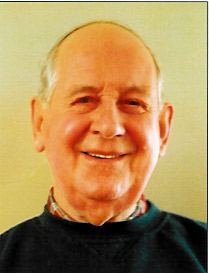 |
Wrington Website: Trevor Wedlake's Writings Eric Henry Gibbs |
 |
Wrington Website: Trevor Wedlake's Writings Eric Henry Gibbs |
 |
||
| Eric Gibbs remembered As an old Wringtonian, Mr George Tutton, driven from his Bristol home by the bombing, and living in rooms in Silver Street, persuaded his old school-friend, Mr Collins of Court Farm, to sell him a ¾-acre plot at the end of the village, on which to build a new home; and then he got cold feet and very pessimistic. "I don't need a home now at my age," he said, "what I need soon is a box, yes, a box not a house !" |
||
| And that is how Eric Gibbs and his wife, Margaret, found themselves able to do what very few do: they bought this plot, and in 1952 built the house on it which was to be their home until they died. Mr Tutton lived on until 1973 when, at age 89, his epitaph declares: "he fell gently asleep" on November 4th of that year. Eric Henry Gibbs was born on May 6th, 1917, the son of the Yatton policeman. At one stage he was a chorister in St Mary's church; when he left school in Weston he embarked on a 7-year apprenticeship in the printing trade. He met Margaret Wills of Wrington, like her father a staunch Salvationist, and they married in 1940. Margaret was always thereafter known as "the wife". Shortly after his marriage, Eric was drafted to the Somersets at Taunton, and then transferred to the RASC. He served in Egypt, Iraq, Syria, north Africa, Sicily, Italy and northern Europe. Package tours never had any allure for him ! After demob he worked the rest of his working life at Organ Bros., the Wrington printers. A great deal of his free time was spent cultivating his large garden. From the garden he had a wonderful panoramic 'command' of several hundred acres of pasture and ploughland, and away to Milton hill above Weston and south to the Mendips. Many times he must have felt himself a "close bosom friend" of the Atlantic, as the winds piled in from the ocean, unimpeded by headland or scarp. I gardened next to him for decades. "Don't bother watering that," he'd call out, "tipping down by Wednesday", or "Shouldn't sow them now, if I was you; 'twon't rain for a fortnight." I'd always thought we were laid-back, uncompetitive gardeners, but, since his death, a neighbour assures me it was never in Eric's book to be second ! "I'm gonna dig earlies first Sunday after Trinity," I'd announce, anticipating his scorn. "Trinity, Trinity," he'd scoff, "when thee bist gone thee bist gone." Following his wife's death in 1990, Eric lived alone and very capably. On the dreariest of winter days he never once complained of being depressed or fed up. He followed rugby, soccer, and cricket from around the world on TV and radio, and sometimes both at once. He took a strange delight in being the messenger of sporting gloom. He'd emerge from the house with a cup of tepid tea (how many did he drink in the last 13 years ?) with "City lost 3-1 at home, Swindon's losing half-time. Rovers ? In the Conference next season !" In summertime he delighted interrupting a quiet hour's contemplative digging with doom-laden Test match commentaries. From his garden path with his tea he'd call "Trecosthick's [sic] out, third slip again." He'd be told to return to the house and not come out again with any more bad news. Half an hour or so later his back door would click and out would come of it "We'm in trouble now," every syllable relished, "We'ms 74 for 4." Eric monitored the grazing heifers and knew if one was off her food, and the near-misses and crashes on Beam Bridge. He also watched what he called the river patrol: those villagers drawn to follow and enjoy the winding course of the Yeo chattering its way through the farm land in timeless delirium down to Woodspring Bay. In the last 3 years, Eric's health had rapidly deteriorated, and he was fortunate in his neighbours whom he called upon even at 5am. He was wheeled to the Remembrance service which he never missed, and had his garden kept neat. Without the regular attention of his nephew he could not have remained home so long. He died in a nursing home on September 16th aged 86. He is survived by his daughter, Juanita. Trevor Wedlake |
||